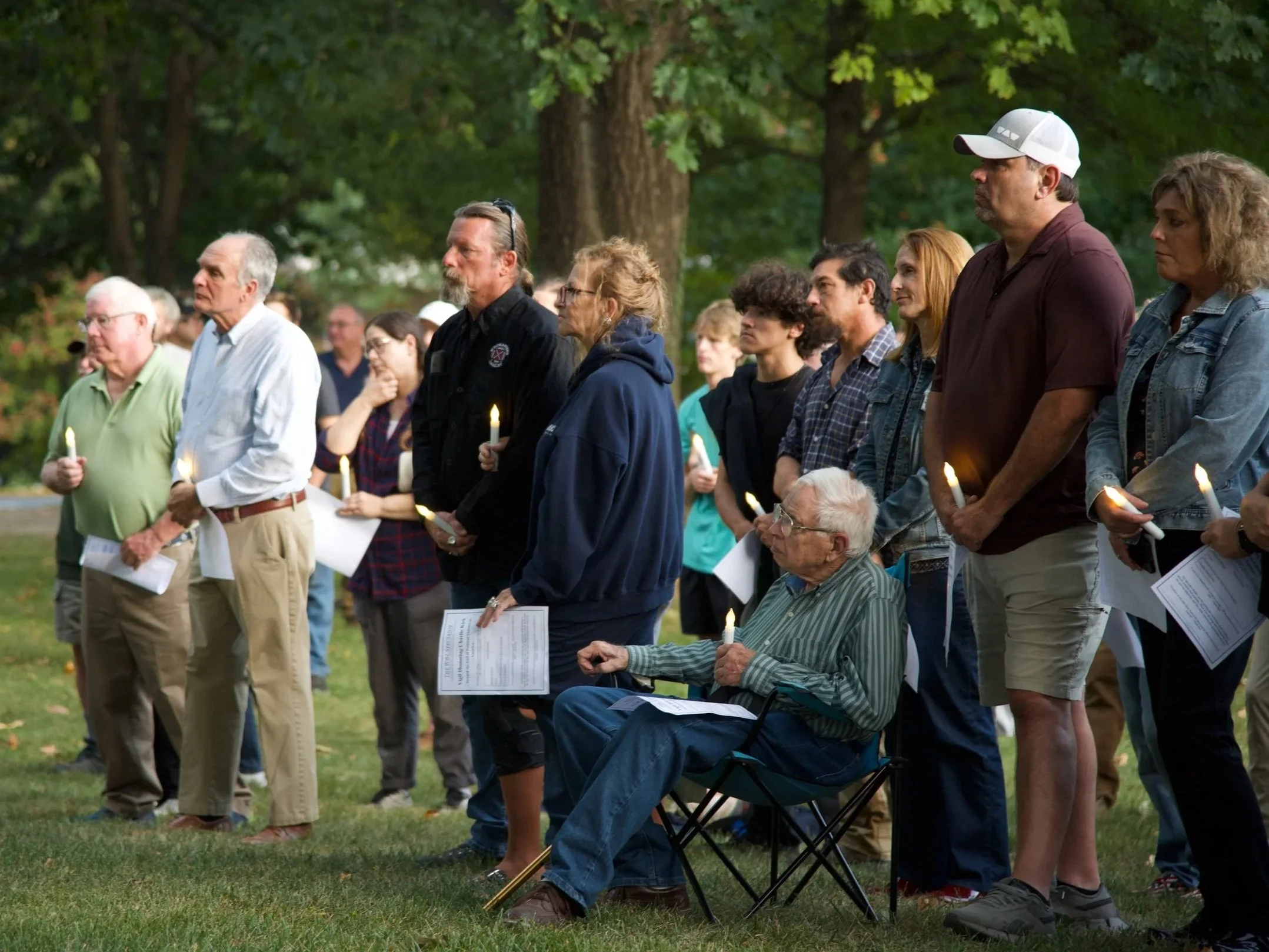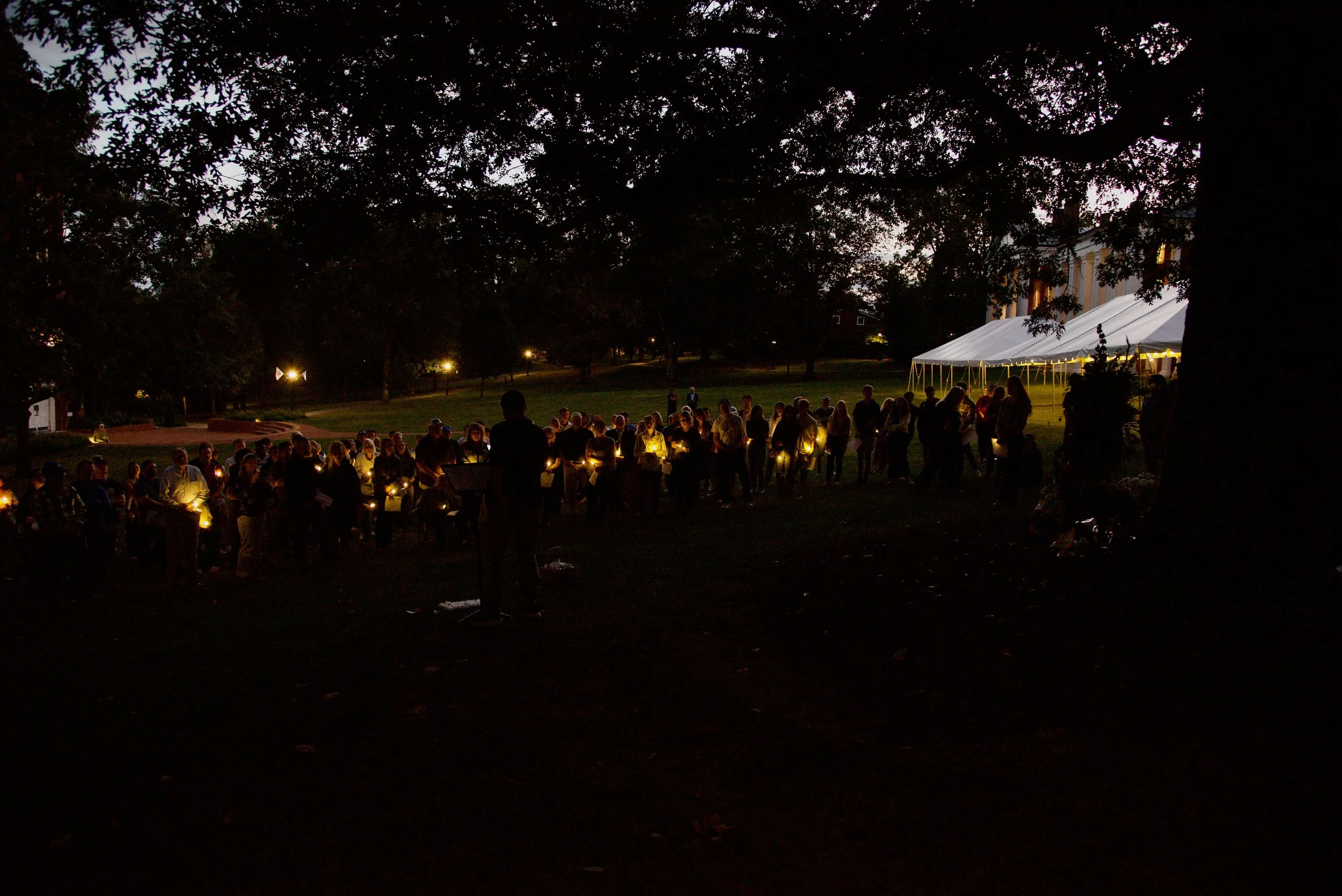Several W&L Students Mock Charlie Kirk’s Assassination
Several W&L Students Mock Charlie Kirk’s Assassination
The online versus in-person responses to Kirk’s killing drew a contrasting picture.
UPDATE: The lead image and title of this piece have been changed to more accurately reflect its subject, the subtitle has been revised for greater clarity and stylistic issues have been addressed. Additionally, aspects of this article have been edited to correct an editorial misunderstanding of the author’s intent.
(Students, local residents, and members of the W&L community attend the vigil for Charlie Kirk hosted by The Spectator. | SOURCE: The Spectator)
In the aftermath of Charlie Kirk’s assassination, a stark contrast emerged between the reactions of some Washington and Lee students on anonymous social media and the general public campus sentiment.
One student wrote on the social media app Fizz that “hitler could die and some of yall would still be like ‘someone lost a father.’”
In a separate conversation, when another user asked — “so you think he deserved to die?” — a peer replied, “Yep! Glad you understand!”
(An anonymous W&L student argues that Charlie Kirk “deserved to die,” receiving several downvotes. | SOURCE: The Spectator / Fizz)
Fizz serves as a campus social media platform where anonymous users must register with their W&L student emails in order to access the app. It also includes a mechanic where students can “upvote” or “downvote” posts, providing a general measure of student sentiment toward posts.
One poster, who received 36 upvotes, wrote that “clearly he wasnt fighting for the unalienable right to life hard enough.” Another dismissed Kirk as a neo-nazi, writing that “everyone’s mind should be closed to a neo-nazi.”
In an effort to memorialize Kirk’s legacy, The Spectator held a vigil on the Colonnade. The event included prayers and testimony about how Kirk’s life impacted America. Students, local residents, and other members of the W&L community attended the event. Publicly, there was no negative reaction to the gathering. However, some students took to Fizz to share criticism.
(A community member adresses the crowd at the vigil held for Charlie Kirk. | SOURCE: The Spectator)
“[H]onoring a man who championed misogynistic, homophobic, racist, anti health care pro gun violence values is about as close minded and stupid as it can get,” another student added, recieving 230 upvotes, indicating support for the statement.
“They could shoot pennywise and y’all would hold a vigil celebrating the work he did for sewer rats,” wrote one student. The post received 263 upvotes.
“Some of u are real fucking stupid,” another user said in reply to a poster about the vigil. This post received nine upvotes.
In contrast, when a defender of Kirk wrote that those speaking against him were “blinded” by their beliefs, they received 48 Fizz downvotes, indicating student disapproval.
Offline, the reaction looked entirely different. Student clubs representing both major political parties wrote a joint statement intending to express bipartisanship and unity in opposition to violence.
“The W&L College Republicans and the W&L College Democrats deeply condemn the tragic assassination of Charlie Kirk.” The statement continued, “Political violence has no place in this country, and we will continue to advocate for an environment of healthy discourse at Washington and Lee University.”
Campus conservatives, in particular, mourned Kirk’s death. In a message to their members, the W&L College Republicans Executive Board wrote that “Charlie was vital in our upbringing as a young conservative generation. Above all, he was a father and a Christian who was killed for being outspoken about his beliefs … This semester, we will seek to live up to the ideals of open campus dialogue that Charlie lived and died for.”
Charlie Kirk spoke to W&L students both in 2019 and as part of the 2024 Mock Convention.
The anonymity of Fizz may contribute to what Dr. John Suler, a Professor of Psychology at Rider University, calls “the online disinhibition effect.” Social media users, according to Suler, “self-disclose or act out more frequently or intensely than they would in person.” Dissociative anonymity, Suler wrote, can contribute to this.
In 2023, a study by Dr. Qi Wang, a Professor of Human Development, Psychology, and Cognitive Sciences at Cornell University found that anonymous social media “fosters moral courage online” and “reduces the risk of adverse consequences for taking moral actions.” Less charitably, Dr. Gabriel Ybarra, an Associate Professor of Psychology at the University of North Florida, wrote that “anonymous participants” in his study were “more aggressive than nonanonymous participants.”
Many students may be willing to upvote a demeaning comment about Kirk on Fizz, but these voices are largely absent in real-life settings. In a small community such as the W&L student body, shielding students from reputational risks can embolden those who would otherwise be silent.
Fizz describes themselves as “a new kind of online community” and “a space designed for every user to be their authentic self.” Content moderators, who have discretion over which posts are removed from the app, are student volunteers drawn from the community.
According to The Collegian, a student newspaper for the University of Richmond, Fizz was created by Stanford students during the COVID-19 lockdowns in order to help students stay “connected to campus life.”
The Director of Information Security for the University of Richmond told Collegian reporters that “if a breach was to occur, what was once anonymous could come out to haunt the poster.” This could create a system where bad actors “could attempt to blackmail students or release sensitive information to hurt people's reputations.”
Fizz did not respond to The Spectator’s request for comment.
At W&L, the social media app has become a hub of student commentary spanning from national politics to campus jokes. Unlike student publications or official statements from organizations, it allows for rapid and unfiltered reactions. This makes it a useful, albeit volatile and incomplete, window into campus sentiment during polarizing events.
Some Fizz comments in the days after the Kirk assassination did condemn the violence. One user wrote “as a leftist, I am appalled at anyone justifying the death of Charlie Kirk. He was a disgusting person who advocated for policies that destroyed lives. But for the love of god, he was also a father.”
(The Spectator’s vigil for Charlie Kirk on Wednesday, September 17. | SOURCE: The Spectator)
Another user, who received the most upvotes of any post mentioned in this article, wrote that “No matter what you think of Charlie Kirk, he’s a husband and a father first … Put politics aside and realize how awful it is for him.”
Other posts used the event to call for stronger gun control measures: “Let’s respect Charlie Kirk and make sure the psycho that killed him can’t get a gun again.”
Another student claimed that Kirk “died from the gun violence in schools that [he] PROMOTED.” This post recieved 516 upvotes.
This article does not include any posts that were removed by Fizz as of September 20th, 2025.





